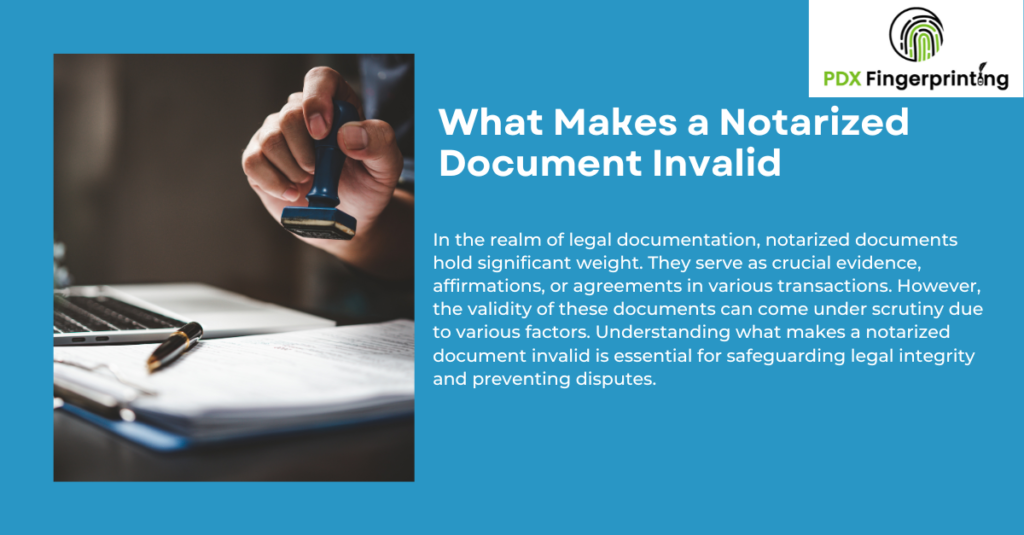
In the realm of legal documentation, notarized documents hold significant weight. They serve as crucial evidence, affirmations, or agreements in various transactions. However, the validity of these documents can come under scrutiny due to various factors. Understanding what makes a notarized document invalid is essential for safeguarding legal integrity and preventing disputes.
Importance of Notarized Documents
The Foundation of Legal Transactions
Notarized documents serve as the backbone of legal transactions, providing a formal record of agreements, affirmations, and declarations. They establish a clear and binding understanding between parties involved in various legal matters.
Establishing Trust and Credibility
By undergoing notarization, documents gain an added layer of authenticity and credibility. The involvement of a neutral third-party notary public lends assurance to the integrity of the document and the identities of the signatories.
Common Reasons for Invalid Notarized Documents
Incomplete Notarial Certificate
Incomplete notarial certificates, lacking essential information or signatures, can render a document invalid. It’s crucial to ensure all required fields are properly filled out during the notarization process.
Illegible/Expired Notary Seal
An illegible or expired notary seal undermines the authenticity of the document. The notary seal should be clear, current, and comply with legal requirements to maintain the document’s validity.
Stamp Over Text
Stamping over the text of a document, especially important sections, can raise doubts about its authenticity and legality. Care should be taken to avoid overlapping stamps that obscure essential information.
Using White-Out
The use of white-out or correction fluid to alter information on a notarized document is highly discouraged. Any signs of tampering or alterations can lead to the document being deemed invalid.
Empty Fields in the Notary Certificate
Leaving fields empty in the notary certificate, such as the date or signature of the notary public, can invalidate the document. All required fields should be completed accurately to ensure the document’s legality.
Ways to Avoid Notarization Pitfalls
Thorough Document Review
Before notarization, carefully review the document to ensure accuracy, completeness, and compliance with legal requirements. Address any discrepancies or errors to prevent potential invalidation.
Confirm Completeness of Notarial Certificate
Verify that the notarial certificate contains all necessary information, including the date, signatures, and notary seal. Completing the certificate accurately is essential for maintaining the document’s validity.
Ensure Legible and Current Notary Seal
The notary seal should be legible, up-to-date, and affixed in the appropriate location on the document. A clear and valid seal enhances the document’s credibility and authenticity.
Exercise Caution When Stamping
When applying stamps to the document, take care to avoid covering important text or information. Place stamps strategically to ensure clarity and readability without obscuring vital details.
Say No to White-Out
Avoid using white-out or correction fluid on notarized documents to rectify errors. Any alterations should be made following proper procedures and clearly documented to maintain the document’s integrity.
Complete All Fields in the Notary Certificate
Ensure all fields in the notary certificate are filled out accurately and completely. Missing or incomplete information can cast doubt on the document’s validity and legality.
Methods for Verifying Notarized Documents
Utilize Online Databases
Some jurisdictions offer online databases where individuals can verify the authenticity of notarized documents. Utilize these resources to confirm the validity of your documents.
Government Resources
Government agencies may provide assistance in verifying notarized documents, offering guidance and resources to ensure the documents meet legal requirements.
Notary Verification Services
Professional notary verification services can assist in verifying the validity of notarized documents, providing an additional layer of assurance for legal transactions.
FAQs about Invalid Notarized Documents
Can a notarized document be rejected?
Yes, if a notarized document fails to meet legal requirements or contains errors or discrepancies, it may be rejected or deemed invalid.
What happens if a notary makes a mistake?
If a notary makes a mistake during the notarization process, it may affect the validity of the document. Depending on the nature of the mistake, corrective measures may be necessary to rectify the error.
Is there a statute of limitations for challenging a notarized document?
The statute of limitations for challenging a notarized document may vary depending on jurisdiction and the nature of the dispute. It’s advisable to seek legal guidance promptly if there are concerns about the validity of a notarized document.
Conclusion:
Understanding the nuances of notarized documents is essential for navigating legal transactions with confidence. By being aware of common pitfalls and taking proactive measures to ensure compliance with legal requirements, individuals can safeguard the integrity and validity of their documents. Through thorough review, adherence to proper procedures, and utilization of verification methods, the mysteries surrounding invalid notarized documents can be unraveled, paving the way for smooth and legally sound transactions.

